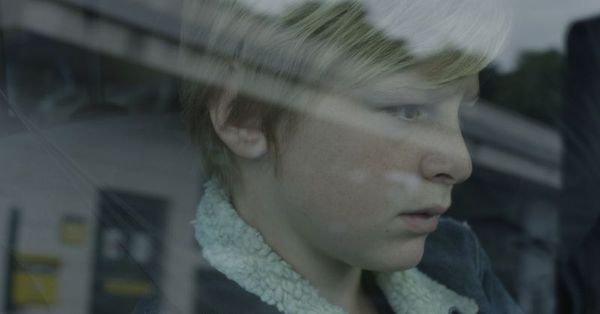Eye For Film >> Movies >> Custody (2017) Film Review
Custody
Reviewed by: Amber Wilkinson

Xavier Legrand steps up from his Oscar-nominated short film Just Before Losing Everything (Avant Que De Tout Pedre) to his debut feature, which acts as a domestic violence continuation of sorts, featuring the same adult cast. The short showed a mum of two, Miriam (Lea Drucker) leaving her violent husband Antoine (Denis Ménochet). In the feature - which has just taken home the best first film and best director prize in Venice - the pair reappear, this time in front of a family court judge, following their divorce, who is hearing arguments about whether they should receive joint custody.
Despite submissions against the idea from their teenage daughter Joséphine (Mathilde Auneveux) and 11-year-old son Julien (Thomas Gioria, making an impressive debut), joint custody is granted and the scene is set for the simmer of potential violence that underlies the rest of the film. The hearing gets things off to a rather static start, and although it sets the scene it is very ‘talky’ compared to all that will follow. When things finally start to move, Legrand shows a strong aptitude for generating tension, employing silences to build the sense of threat, particularly when Julien is alone with his dad, while also keeping a watchful eye on the young boy, whose body language screams stress.
These scenes also avoid outright violence, showing how once abuse has occurred - or even potentially if it has not - the threat of it can be just as debilitating. The cool colour scheme employed by Nathalie Durand (who also worked on the short) serves to further emphasise the bleak mood.
But though a short film, even one of half-an-hour as Legrand’s was, can be carried almost solely on this sort of tension, a feature needs something more. While it is reasonable to assume that having the human equivalent of an unexploded powder keg in the room would indeed dominate attention, we get little sense of the members of the family as real people. Rather than show them in conversations outside the family unit, which would add more character, Legrand instead adds more incident – epitomised by a largely redundant subplot concerning Joséphine, which potentially could have added another dimension but is ultimately only used as an additional stress device.
Like many actors-turned-director, Legrand knows how to handle his cast and Drucker, Ménochet and Gioria all work well together, with the youngster, in a part that relies more on what he does than what he says, showing real potential as a future star. Without the character depth to engage the audience, this becomes more of an exercise in, ‘look how awful this is’, which though worthy and potentially educational in terms of the pervasiveness of domestic violence, is surely going to make obtaining audiences outside of festivals a tough ask.
Reviewed on: 09 Sep 2017
















